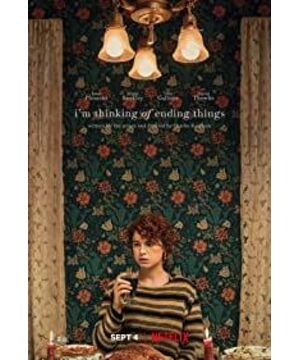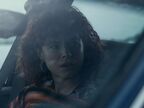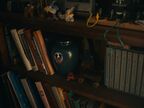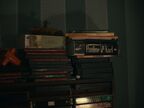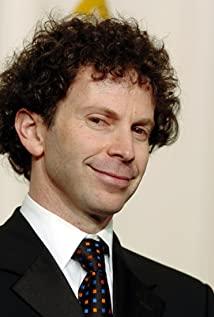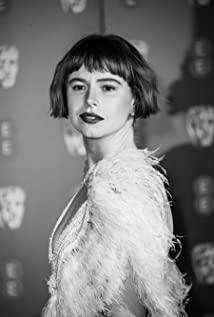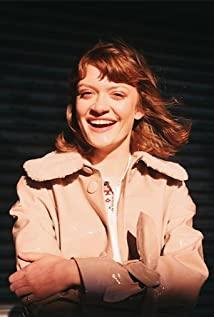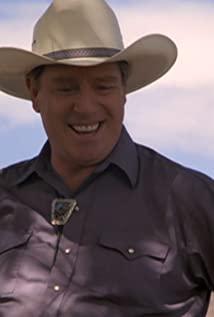"I Want to End All of this" is a work full of complex thoughts. It uncovered a road trip through a seemingly simple, seemingly divorced couple to meet their parents. The most unforgettable scars in an old man’s heart: family pressure, remorse when aging, lifelong loneliness, the hopelessness of love, the suffering that is not taken seriously...
However, in the end of the movie, after a beautiful and grand fantasy, everyone ushered in the ending of "end this all".
Spoiler alert
1. Love Lucy
Straightforwardly, to reveal the answer directly, the heroine Lucy is a character imagined by the hero Jack.
Lucy is not a real character. At first glance, Lucy is planning to meet Jack’s family after acquainting with Jack for a while, but throughout the movie, Lucy’s character is actually a very unstable existence: constant Changed names (Lucy, Louisa, Lucia, Ames), changes in clothing and costumes (earrings, clothing styles), scenes when meeting Jack (party, restaurant waiter), majors studied (neurology, film majors, old age) Studies, physics, and still a painter), and even in certain scenes, I think the appearance of Lucy as an actor has changed... These are enough to prove the illusion of Lucy's existence.
From the very beginning, when the male protagonist talked about a poem by his favorite poet William Wordsworth, he mentioned that the poem was for a young but "idealized" name "Lucy" written by the girl.
This is probably the source of Jack's name for the dream lover "Lucy", and this Lucy is also the "idealized" lover image in Jack's mind. She is good at talking, cheerful and humorous, and proficient in various subjects.
Many things we saw in Jack’s room when he was young, for example, a book called "Rotten Perfect Mouth" by AVA.HD is actually the poem called "Bone Dog" written by Lucy in the car. Shelf There are books on chemistry, physics, and color theory that Lucy talks about. There is also a collection of poems by William Wordsworth on the bookshelf. Those movies are also the cause of Lucy's passion for film criticism.
Of course, the image of Lucy is not Jack’s imagination, but also has its prototype. In the middle of the film, it was mentioned in Jack's house that Lucy and Jack met at a party. Jack summoned up the courage to ask Lucy's phone number, and the two began to date in agreement. But when Lucy finally faced the old cleaner, the real, old Jack, she (actually Jack herself) told what really happened at the time: Jack was just a "weird" in the eyes of the girl. There was no conversation between the two, and nothing happened. The girl probably didn't even remember Jack's appearance.
Missing that time is an eternal difference. But in Jack’s fantasy, he bravely talked to the girl, Lucy also tolerated his ordinary appearance and pretending to be a sophisticated personality, the two finally came together, and even had the itinerary to meet the parents this time.
On the other hand, even in the fantasy, Jack's inner timidity is still expressed through the inner heart of Lucy's character. For Lucy, this "meeting with parents" journey is not a further emotional step, but a step. In the last part of the emotional farewell, there was always such an invisible barrier between her and Jack, and she also mentioned the idea of going home countless times.
Jack asked: "Are you going back to the farm?"
Lucy said, "No."
She just wanted to end it all.
2. Soul Broken Jack
As I said above, Jack was the school cleaner. He fantasized about such an unprecedented past in the old cleaning room, and finally ended his life in the small trailer before middle school and was buried by snow.
So, what is Jack's life like?
Jack's whole life is actually very bitter. Although there is no explicit statement in the film except for the scenes of old age, we may be able to get a glimpse of the truth from the attitude of Jack's fantasy parents towards Jack.
During Jack’s fantasy of Lucy’s visit to their home, his parents appeared in the form of old, middle-aged, middle-aged, and middle-aged. Middle-aged is the time when the real Jack expects to take his girlfriend home. At that time The parents are probably less than fifty years old, and there are some minor physical problems, but it’s okay. They showed great enthusiasm for Lucy’s arrival, but we noticed that Jack’s father almost turned a deaf ear to Jack. Attitude, even when shaking hands with Jack, the eyes are not far from Lucy, which shows that the relationship between Jack and his father is estranged.
The mother’s over-enthusiastic attitude also made Jack very uncomfortable. On the one hand, the younger mother was complaining about Jack’s naughty and playfulness. On the other hand, he also said that Jack was gradually closing his heart, combined with a few fragmentary clips. In the quarrel between father and mother, we can probably infer that Jack had an unpleasant childhood. Even when Jack takes Lucy back home, he has to take Lucy to visit the farm before he can make up his mind to enter the house. It can be seen that "home" is by no means a happy place.
The old age of his parents did not make Jack worry. We can see the middle-aged and old state of his parents. Among them, in the middle-aged and old age (about 50-60 years old), the state of the mother is already very bad and needs to sit down. The wheelchair was fed, and in old age, he was dying on a sickbed. My father's middle-aged and old state was forgetfulness, and it became more serious in his old age, and he could hardly remember any words that came to his lips.
So Jack must have spent quite a lot of years caring for his parents in his middle age.
What's more sad is that this kind of care is not well known, so Jack imagined Lucy to say those words of approval when he was caring for his mother. Unfortunately, in the real situation, no one knew his dedication, he was silent. Guarding his parents to death, he inherited an old house with a swing at the door (Lucy's comment on this house is like an uninhabited place)
Every day I go to school to clean up in silence, watching the beautiful dancing girl on the stage, watching the man who bravely speaks his heart and the waitress on TV come together, regretting the youth that I missed.
As a result, that youth was reproduced in his fantasy, although he was still hesitant, so Lucy would say those "don't remember looks" words when facing the real him, but it was also at the end. At that moment, she asked Jack with concern again. It was probably this sentence that made Jack finally relieved.
After that, there was a dance, sweeping away the dust, returning to the car, taking off his clothes, and dying of hypothermia. As he died, he followed the pig and walked into the stage of public attention.
On that stage, he first completed the coveted scientific achievement and won the Nobel Prize. The stage was transformed into his favorite musical "Oklahoma", on which he played Chad and sang "Lonely Room". This song describes a character who is in distress in reality but can dream about it in his sleep.
What excites him more than his scientific achievements and stage performances is that this time, he finally became the focus of the audience. Although his classmates, his family, and his lover are all old, they do not hesitate to applaud. At this moment, at the last moment of his life, he also reached the peak of life in his fantasy.
He finally ended it all.
3. The sad person in the painting
In the film, there is a point worth digging deeper, which is the discussion of paintings.
When Lucy visited Jack's house, Jack introduced that Lucy was good at drawing, so Lucy used her mobile phone to show Jack's parents her paintings.
From the plot in the basement behind, we can see that Jack has painted many paintings (but he obviously failed to make a living), and the paintings shown by Lucy are those that Jack used to refer to (the paintings are actually 18- The work of the 19th century American painter Ralph Albert Blakelocke).
The interesting thing is that my father and Lucy had a discussion about these paintings.
Father believes that there is no person in the painting, there is no soul, even if you Lucy wants to express a sad emotion, but if there are no sad and crying characters in the painting, who can feel this atmosphere?
Lucy's point of view is that we can take this "sad person" into our own role and feel the emotions conveyed by the picture itself.
The difference between his father’s and Lucy’s views may be that Jack had disagreements with his father when he was learning to paint (which may have led to the alienation of the father-son relationship), and Jack failed to become a famous painter in the end, so he could only pass Lucy in this fantasy fulfills her wish, but even in this fantasy, the role of the father still holds an incomprehensible attitude. Perhaps it is precisely because of his lack of self-confidence in his paintings that Jack very much does not want Lucy to enter the basement, because that is a testament to his failure.
The director's response to this was the last scene of the film, the trailer buried deep in the snow.
There is no one in the picture, but when we want to understand the truth of the story, this almost static and empty scene can also make people feel a huge sense of sorrow.
On a certain level, Jack still won, but the price was the end of his life.
4. Pig, dance, ice cream
There are also three very interesting images in the film, let's briefly talk about them below.
Pigs have appeared in the movie several times, except for the pigs that started to be printed on the sign of the dairy shop in Tulsi
The first impressive appearance of pigs (appearance in language) was the terrible cause of death of several pigs on the farm. Several pigs gave birth to maggots in the lower part of their bodies due to their father's negligence.
Looking at the whole film, the image of the pig is actually a portrayal of the life of the male protagonist Jack. His father’s negligence may represent the disharmony of Jack’s family, and in this harsh environment, Jack is suffering. A little bit of embezzlement's life, towards death.
So at the end, the picture of Jack following the pig naked, it is not difficult to understand, this is a parade on the dying.
In Jack’s fantasy, after he was finally relieved, the young Jack and the young Lucy in the illusion performed a beautiful dance (this is undoubtedly an extension of what he sees every day), here During the dance, two people hug each other, propose marriage, and hold a wedding.
But in the joy after the wedding, a man dressed in a cleaner's costume wins love and stabs the young dancer Jack.
This image is undoubtedly Jack. It’s just that Jack who is older and regrets his actions even more. Although he imagines that he can have such a romantic relationship, he also knows why he has not been able to. Getting a happy life is actually the result of being stifled by myself. My hesitation, timidity, and cowardice ended the possibility of happiness, so I could only clean up the dust in silence and sigh for no reason.
Finally, the Tulsi Town dairy shop, this, is probably really Jack’s favorite place to patronize. He has been nostalgic for this place since he was a child, and every time he passes by, he must go to this shop to buy a cup of ice cream (at the beginning we It can be seen that the elderly have cups in his car, and the trash can outside the school is full of leftover cups).
Jack also mentioned at the beginning that many people in the school became waiters in the end, so in the Tulsi Town dairy shop that he fantasized about on a snowy night, he also saw the three shop assistants at school. Girl, the two girls who laughed at him were naturally rebellious and defiant.
The other girl was just an unknown girl who passed by him at the time. Maybe it was just because she smiled slightly at Jack. Jack remembered her, so this girl became the honest waiter, and Jack used her to say Some words like "beautiful girls will suffer" are probably deliberately trying to avenge those "beautiful girls" who are rude to him.
5. The default puzzle, the last problem to be solved
There is a very interesting shot in this film. Lucy is sitting in the middle of the dining table. Obviously we know that a little left and a little right outside the lens are Jack’s father and Jack’s, but the lens is stuck in this camera position very accurately. So Lucy seemed to be the only one on the noisy dining table.
Although the film is based on Jack’s fantasy as the main line, it is based on Lucy’s perspective. In the eyes of the audience, it seems that only the role of Lucy is real. Jack, who is reticent at home, is a mother with a weird smile, and has a proliferation of cervical spine. Both of his fathers are out of line with Lucy, who is honest.
Of course, when we look back at this scene after watching the movie, we will find that the real default role is Lucy herself.
In the film, Lucy keeps receiving calls from herself, and the caller keeps changing as her name changes. When she picks up the phone, the man inside keeps saying: Now there is only one person left. The problem is solved.
This film does not give a clear answer to this "unresolved problem". Of course, because the film is based on a novel adaptation, the novel tells the readers more bluntly at the end that this "unsolved problem" is caused by the hero constantly Remind yourself of the words, that is, "I want to end this."
Lucy once thought that all creatures worked hard to live, but Jack told her that this was not the case. Some bugs would explode, and not all creatures had the purpose of surviving.
Some people may be like this. When he has a rough life, full of regret, and can only realize his own dream in an illusion, the default last piece of the puzzle in his life is probably not the hope of surviving, but A simple sentence:
"I want to end it all."
View more about I'm Thinking of Ending Things reviews


